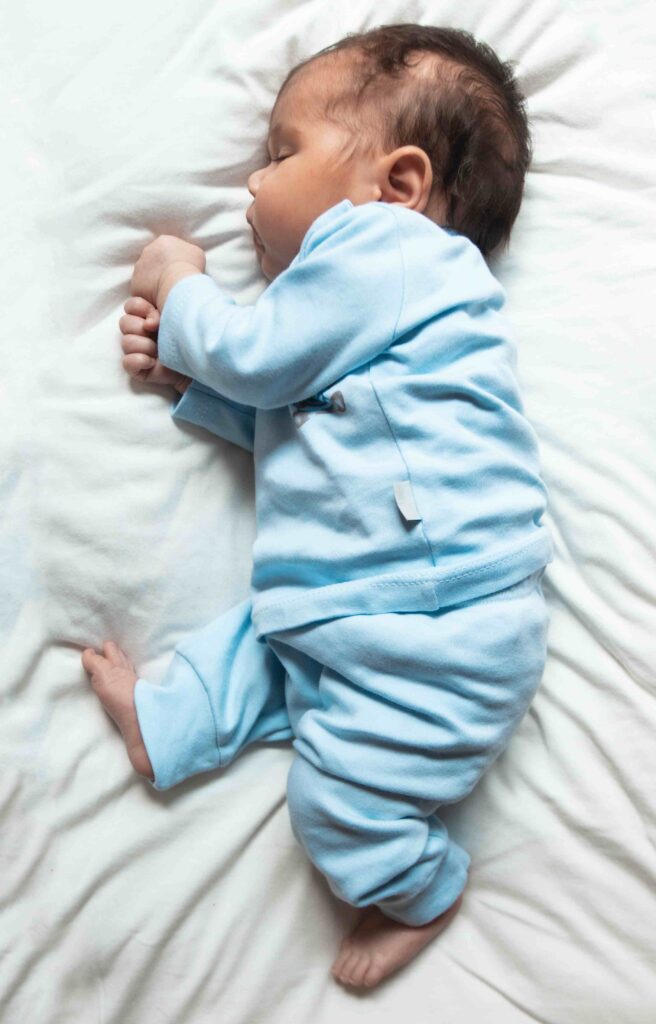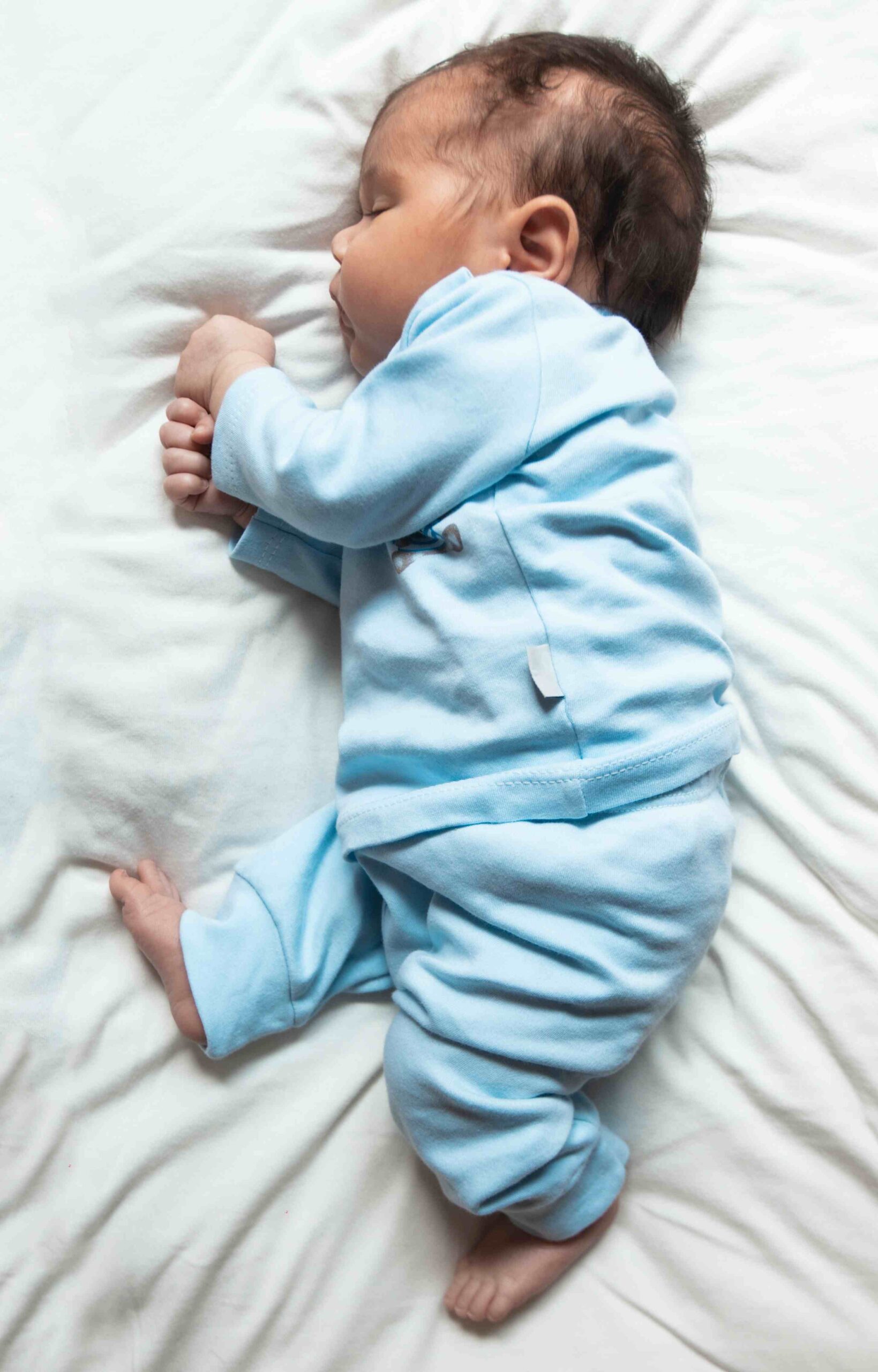10 Home Remedies for Bedwetting in Babies

Bedwetting in babies and toddlers is a topic that people rarely discuss in depth. Probably, due to the stigma associated with bedwetting, or the myths and misconceptions surrounding bedwetting in the little ones. I forgot to talk about this issue in my article on issues that babies face.
Did you know that 5 million children in the US, including 20% 5-year-olds, 10% 7-year-olds, and 5% 10-year-olds are bedwetters? Given these worrying statistics, we should discuss this topic. Without further ado, let’s dive into it.
What Causes Bedwetting in Babies?
Bedwetting in babies is a complex issue that is triggered by several factors. These are the five most common triggers of bedwetting in babies:
1. Deep Sleep
When babies are fast asleep, their brain signals relax and stop sending signals that the bladder is full. As a result, the babies end up wetting the bed. Similarly, babies with complex sleep conditions like upper air obstruction or apnea are highly likely to bed wet.
2. Psychological Issues
If your baby is battling a psychological issue, they are likely to wet their bed as a coping mechanism. Psychological issues such as Attention Deficit Hyperactivity Disorder (ADHD)make the central nervous system, which is responsible for managing bed wetting, to delay.
3. Lower Urinary Tract Dysfunction
Lower urinary tract dysfunction is a condition that is characterized by a lack of coordination between the bladder outlet and the bladder. The lack of proper coordination makes some urine remain after peeing, and coming out during sleep. Lower urinary tract dysfunction is so common in babies and leads to bedwetting.
4. Maturation Delay
Babies have little control over their bladder since their urethral sphincter muscles are still developing. The more the muscles delay in developing, the more the baby becomes wet their bed.
5. Genetics
Genetics might also influence the bed-wetting pattern in babies. Research by Yale Medicine revealed that babies who had both parents wetting the bed as babies were 77% more likely to experience the same.
At some point, your baby will stop wetting their bed, then out of the blue, “go back” to the same habit. When that happens, don’t panic, don’t threaten to expose them to their friends, and don’t scold them. It happens, it happened to me and maybe happened to you too. Scolding them only makes the situation worse, and may go on to their teen years.
What Causes Bed Wetting in Older Children?
I have mentioned an instance where your baby stops wetting their bed and then goes back to it. This is common in older children and may thrive up until teenagers. What causes this secondary bed wetting?
1. Poor Peeing Habits
Older children have a habit of holding urine for a long time, especially during the daytime when they are playing. They may not know it, but this habit eventually makes it hard for the bladder to hold urine for long, leading to bedwetting.
2. Urinary Tract Problems
Secondary bedwetting may also be triggered by urinary tract complications. If you suspect that your toddler or teenager has urinary tract complications such as tumors, take them for diagnosis and treatment.
3. Hormonal Imbalances
During puberty, teens experience drastic hormonal changes, which consequently affect their ADH levels. The ADH hormone is responsible for urine production and if the urine is in excess, may make them bedwet.
4. Caffeine
Toddlers and teens like caffeine-rich drinks such as coffee, especially at night. These drinks fill up their bladder, increasing the risk of bedwetting.
5. Underlying Medical Issues
Another reason why your toddler or teen is wetting their bed could be due to an underlying medical condition. Constipation, type 2 diabetes, and urinary tract infection (UTI) are the leading medical conditions responsible for bedwetting in older children and teens.
6. Sexual Abuse
Victims of sexual abuse such as rape and sodomy are highly likely to relapse into bedwetting even in their teenage.
7. Constipation
Constipation is characterized by irregular bowel movement and exertion of excess pressure on the rectum. The pressure might adversely affect concentration and the signals between the brain and bladder, leading to bedwetting.
How can you Stop Bedwetting in Older Children?
If you are worried about your toddler or teen wetting bed, use these three approaches: treatments, lifestyle adjustments, or home remedies.
A. Treatments for Bedwetting in Older Children
The research on bedwetting management in older children is ongoing, but some treatments have been developed to counter the “menace”. Currently, there are two treatments for bedwetting in older children; pharmacological and behavioral. The combination of these treatments led to the development of motivation therapy, pharmacotherapy, and bedwetting alarms.
B. Motivation Therapy (Urotherapy)
It is the first line of treatment for bedwetting in older children and teens. The treatment involves taking the person through a series of exercises to strengthen their bladder and improve bladder control. Reducing fluid intake two hours before bedtime, emptying the bladder regularly, and improving the void posture could reduce bedwetting.
Urotherapy also includes behavioral modifications and pelvic floor muscle training. The advantage of urotherapy over other treatments is that it has no side effects since it does not involve the use of drugs. However, this treatment is less effective than other treatments such as cognitive behavioral therapy (CBT) for bedwetting.
C. Pharmacotherapy
Pharmacotherapy is a treatment highly recommended for older children with hormonal imbalance issues.
Desmopressin Acetate is the most commonly used drug to treat bedwetting triggered by these hormonal imbalances.
Your doctor may also recommend the use of anticholinergic drugs to prevent bladder contractions, leading to larger bladder capacity.
D. Bedwetting Alarm
Bedwetting alarms are specialized portable alarms that the child wears before going to bed. How do these alarms work? You might ask.
When the first drops of urine hit the fabric, the alarm goes off, waking them up to empty the bladder.
Lifestyle Adjustments to Manage Bedwetting in Children
- Not only do adults need lifestyle changes and adjustments, but babies and children struggling with bedwetting should adjust their lifestyles, too. Use these lifestyle tips and your babies/children will bid goodbye to bedwetting:
- Limit their liquid intake, especially a few hours before going to bed. Since liquids are essential, let the children take them in the early hours.
- Minimize giving the babies products which may irritate the bladder. Sweeteners, caffeine, artificially flavored drinks, and citrusy juices irritate the bladder, making them pee frequently. Avoid them.
- Avoid criticizing, throwing jibes, and ridiculing children when they wet their bed. Instead, congratulate them when they don’t wet the bed. When they wet the bed, give them words of affirmation.
- Have an open discussion with the children about bedwetting and find a viable solution.
- Keep your baby/child well-hydrated. Keeping the baby thirsty for a long time pushes them to drink a lot of fluids at any opportune time, and in turn, pee in their sleep.
Home Remedies to Help Babies Overcome Bedwetting
There are 10 incredible home remedies that you can use to help babies/children overcome bedwetting. Try them out and you will see the results within the shortest time possible.
1. Bladder Exercises
There are two major exercises that you can encourage your young one(s) to practice to strengthen the urinary tract and suppress bedwetting:
Holding and squeezing a small ball (the size of a tennis ball) between the thighs at different times of the day for a month or two. Doing so strengthens the pelvic muscles and makes them hold urine for a longer period.
Holding pee for about 20 minutes when the urge to urinate offsets. This expands the bladder and improves urination control.
2. Massage
You can massage the child’s (ren’s) lower abdomen to minimize involuntary contraction of the bladder and flexing of the pelvic muscles. Managing the functionalities of these two areas results in fewer episodes of bedwetting.
3. Apple Cider Vinegar
Experiments by caregivers and parents have shown that apple cider vinegar can help suppress the bedwetting menace in babies and children. Preliminary research revealed that vinegar lowers acidic levels in the tummy which triggers the bowels and causes bedwetting.
Since the apple cider vinegar is acidic, mix two tablespoonfuls of it and mix with a glass of water.
If your baby “hates” anything bitter, you can add a few drops of natural honey to make it sweeter.
4. Mustard Seeds
Mustard seeds have been proven to be an ideal solution to urinary tract infections (UTI) in babies/children. If your baby’s bedwetting is triggered by UTI, giving your baby a mix of mustard seeds and milk will solve the problem.
5. Honey
Giving your baby a teaspoonful or teen, a tablespoonful of honey could help them hold pee for longer and bedwet less.
6. Cranberry Juice
Like mustard seeds, experiments have proven that cranberry juice can seamlessly manage UTIs in babies and older children. Since UTI is one of the leading causes of bedwetting, giving your baby/teen the juice might help them manage bedwetting.
7. Indian Gooseberry
For a long time, parents have been using Indian gooseberries to suppress prolonged bedwetting in teens and young adults. Preliminary research has also shown that adding turmeric to these berries helps babies and children stop bedwetting.
8. Jaggery
Jaggery, which is a by-product of sugar production, is a good solution to bedwetting in babies and children. It keeps their bodies warm, hence minimizing bedwetting, which is common when temperatures are low.
How do you give jaggery to babies and children? There are two common ways of preparing jaggery for your little ones:
- Prepare a mix of jaggery, a pinch of salt, and roasted sesame seeds.
- Mix warm milk with a small piece of jaggery and give it to your child every morning.
9. Walnuts and Raisins
Giving your child a serving of three walnuts/almonds and two raisins before they retire to bed can help them stop bedwetting. For effective results, you should use this approach for several months.
10. Cinnamon
Cinnamon contains antioxidant properties that suppress diabetic symptoms, including bedwetting. Therefore, if your child is diabetic and is struggling with bedwetting, give them a piece of cinnamon to chew every day. Use Cinnamon powder as a topping for their favorite beverage.
Frequently Asked Questions on Bedwetting in Kids
Does milk cause bedwetting in babies?
Research has shown that calcium-rich products such as dairy products result in hypercalciuria, a condition characterized by excess calcium in urine. If your child takes milk and other fizzy drinks before bed, they are likely to bedwet, since the calcium tightens the bladder.
When should bedwetting in children be considered a problem?
Bedwetting in most children starts to reduce by the time the child is four. At this age, the baby has better control of the bladder. If your baby regularly wet the bed past five years, it could signify an underlying condition.
Does childhood trauma trigger bedwetting?
Yes. Trauma and other stressors may trigger bedwetting in children. Your baby who was previously “dry” may start to bedwet if they are subjected to trauma like sexual molestation and physical assault.
Does enuresis in babies go away?
Yes. Enuresis, the clinical name for bedwetting, goes away after some time in children. Babies above five years are likely to experience fewer episodes of enuresis. As time goes on, they outgrow this condition completely.
What are the types of enuresis?
There are four major types of enuresis in babies:
Primary enuresis: It is the most common type of enuresis. It affects babies before and during toilet training.
Secondary enuresis: It is when a child who was initially “dry” relapses into bedwetting.
Diurnal enuresis: It is when the baby wets during the daytime.
Nocturnal enuresis: It is a very common type of enuresis since almost 100% of babies experience it-wetting bed at night.
What is the difference between enuresis and incontinence?
The two terms can be used interchangeably and they all mean the same thing; bedwetting.
Bottomline
Bedwetting can crash and crush children’s egos, esteem, and focus. You don’t have to remind them that they are bedwetting; they know it. Instead, you should be a supportive pillar by offering them solutions. The treatments, lifestyle adjustments, and in this article will come in handy in walking the journey to “dryness” with your beloved little one. Make it memorable in a good way for them.



